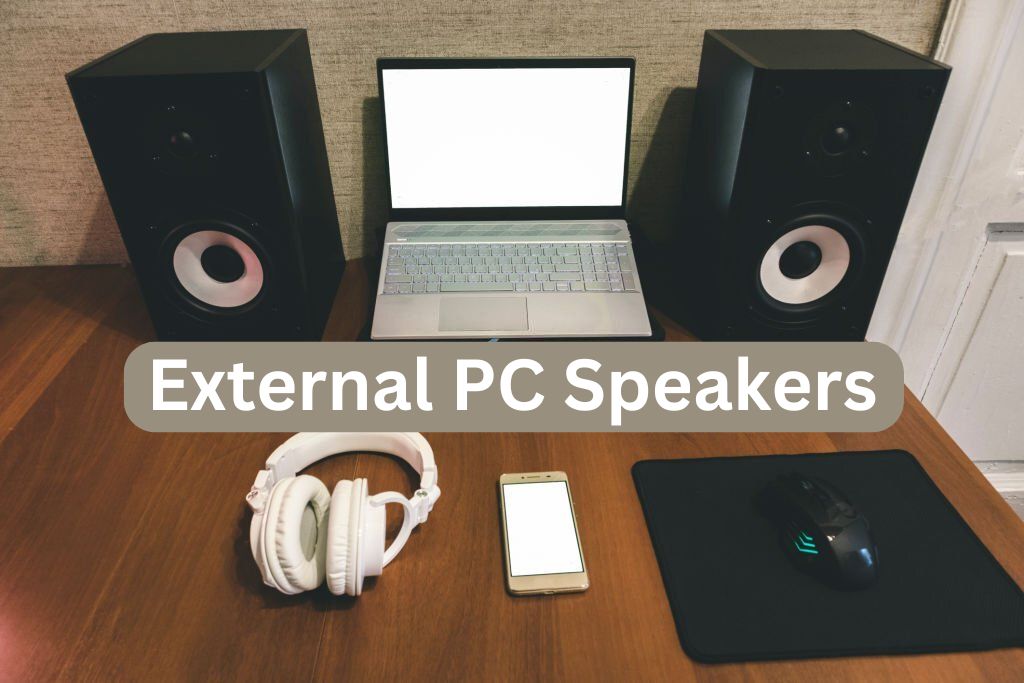
In 2025, external PC speakers have become more versatile and advanced than ever, offering superior sound quality to enhance your desktop or laptop experience. With advancements in audio technology, these speakers deliver immersive soundscapes for gaming, streaming, music production, and daily computer tasks. Whether you’re looking for crystal-clear treble, booming bass, or a well-balanced sound profile, external speakers for PCs cater to a range of preferences and budgets.
As the market for external PC speakers expands, consumers now have access to a variety of options, from compact 2.0 systems to larger 2.1 setups with dedicated subwoofers. Many of the latest models include features such as Bluetooth connectivity, RGB lighting, and customizable sound profiles, allowing users to fine-tune their audio experience. Additionally, improved materials and build quality ensure durability, while sleek designs blend seamlessly with modern desktop setups.
In this guide, we’ll explore the best external PC speakers of 2025, highlighting their key features, performance, and what makes them stand out in a crowded market. Whether you’re upgrading your current speakers or starting fresh, this overview will help you find the right option to elevate your PC audio experience.
Why Should You Get External PC Speakers?
While most Computers Come With Built-In Speakers, they are often not powerful enough to deliver high-quality sound. External PC speakers can offer better sound quality, louder volume, and a more immersive listening experience. Additionally, external speakers can be positioned for optimal sound delivery and can be easily disconnected when not needed.
What Types Of External PC Speakers Are There?
There are two main types of external PC speakers: desktop speakers and portable speakers. Desktop speakers are designed to be placed on a desk or bookshelf and are generally larger in size. Portable speakers, on the other hand, are more compact and lightweight, making them easy to take on the go.
What Features Should You Look For When Buying External PC Speakers?
When shopping for external PC speakers, here are a few features to consider:
Audio Quality:
Look for speakers with high-quality audio drivers and a wide frequency rangeensure clear and accurate sound reproduction.
Size:
Think about the size of the speakers and whether they will comfortably fit on your desk or in your workspace.
Connectivity:
Check that the speakers are compatible with your computer’s audio output. Options include wired connections like USB or 3.5mm jacks, as well as wireless options like Bluetooth.
Design:
Choose a design that complements your workspace and personal style.
Price:
Consider your budget and choose speakers that offer the best value for your money.
Here Are Some More Points To Consider When Buying External PC Speakers:
Power:
Consider the power output of the speakers and whether they are suitable for your needs. A higher power output generally means louder sound, but it also means a higher price tag.
Frequency Response:
Look for speakers with a wider frequency response range for more accurate sound reproduction. The frequency response is usually measured in hertz (Hz) and is the range of frequencies that the speaker can reproduce.
Brand:
Consider the brand of the speakers and look for well-known and reputable brands that have a history of producing high-quality audio products.
Surround Sound:
If you are looking for a more immersive audio experience, consider speakers that offer surround sound capabilities. Surround sound speakers have multiple drivers that can create a more realistic and immersive soundstage.
Aesthetics:
Choose speakers that fit in with your personal style and the decor of your workspace. Speakers come in a range of designs and colors, so it should be easy to find a set that complements your setup.
What to Look for When Buying External PC Speakers:
External PC speakers are an essential accessory for enhancing your computer’s audio capabilities. Whether you use your computer for gaming, watching movies, or working, investing in good-quality speakers can make a significant difference. Here are some detailed aspects to consider when buying external PC speakers:
1. Audio Channels
- 2.0 Speakers: These include two speakers for left and right audio. They are simple and compact, suitable for basic audio needs.
- 2.1 Speakers: These include two speakers and a subwoofer, providing better bass response for music and movies.
- 5.1 or 7.1 Surround Sound: Ideal for gamers and movie enthusiasts, these systems provide immersive audio by including multiple speakers placed around the room.
2. Types of Connections
- Wired Speakers: Usually offer better audio quality and are more reliable for long-term use. They connect via USB or a 3.5mm audio jack.
- Wireless Speakers: Bluetooth or Wi-Fi-enabled speakers are convenient, especially for setups with limited cable management.
3. Portability
If you frequently move your speakers or need them for multiple devices, look for portable, lightweight options. Portable speakers often come with rechargeable batteries for added convenience.
4. Built-In Features
- Volume and Bass Controls: Many speakers come with knobs or buttons for adjusting volume, bass, and treble directly.
- LED Lighting: Gamers might prefer speakers with RGB lighting for a stylish setup.
- Built-In Microphones: Useful for video calls or voice commands.
- Headphone Jack: Allows for easy switching between speakers and headphones without unplugging cables.
5. Compatibility with Devices
Ensure the speakers are compatible not only with your PC but also with other devices you might use, such as smartphones, tablets, or gaming consoles.
6. Materials and Durability
- Speakers with wooden enclosures often produce richer and warmer sounds compared to plastic ones.
- Look for durable materials that can withstand wear and tear, especially if you plan to use the speakers outdoors or in multiple locations.
7. Power Source
- USB-Powered Speakers: Convenient for laptop users, as they draw power directly from your computer.
- AC-Powered Speakers: Often provide better sound quality but require a dedicated power outlet.
8. Reviews and Ratings
Before purchasing, check online reviews and ratings to understand the performance and reliability of the speakers. User feedback can provide insights into real-world issues like durability, sound quality, and ease of use.
9. Warranty and Support
A good warranty and customer support can save you from frustration if the speakers have issues.
Conclusion:
In conclusion, External PC Speakers can be a great investment for anyone who wants to improve their computer’s audio output. When shopping for speakers, consider the audio quality, size, connectivity, design, and price. Look for well-known brands and consider features like power, frequency response, and surround sound capabilities. With so many options available, it should be easy to find a set of speakers that meets your needs and fits your budget.
FAQs:
Q. What are the benefits of using external PC speakers?
A. External PC speakers provide superior audio quality compared to built-in laptop or monitor speakers. They offer enhanced sound clarity, deeper bass, and an overall more immersive experience for gaming, movies, music, and other media.
Q. Can I connect external PC speakers wirelessly?
A. Yes, many external PC speakers in 2025 offer Bluetooth connectivity, allowing you to wirelessly connect your speakers to your PC. This eliminates the need for extra cables and provides more flexibility in speaker placement.
Q. What should I consider when buying external PC speakers?
A. When purchasing external PC speakers, consider factors like sound quality, size, price, and additional features such as Bluetooth, RGB lighting, or surround sound. Your choice should depend on your specific needs, whether it’s for gaming, music, or professional use.
Q. Are external speakers better than soundbars for PC setups?
A. External speakers generally provide better sound separation and depth compared to sound bars. While soundbars are great for compact setups and can offer a wider soundstage, external speakers with multiple drivers (like 2.1 systems) deliver more dynamic audio, especially for bass-heavy content.
Q. Do I need a sound card for external PC speakers?
A. Most modern external PC speakers can connect directly to your PC’s standard audio output without the need for a dedicated sound card. However, for audiophiles or professionals who demand the highest sound quality, a dedicated sound card can enhance performance.
